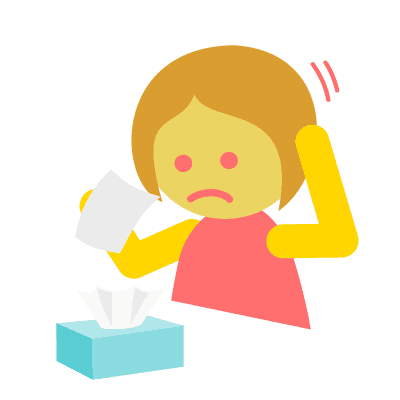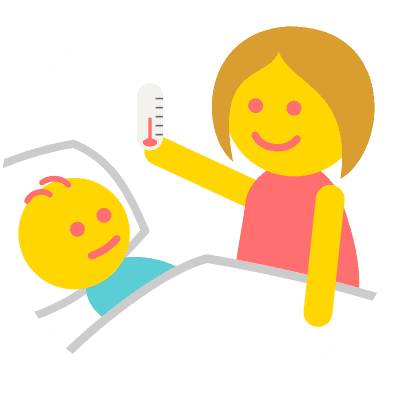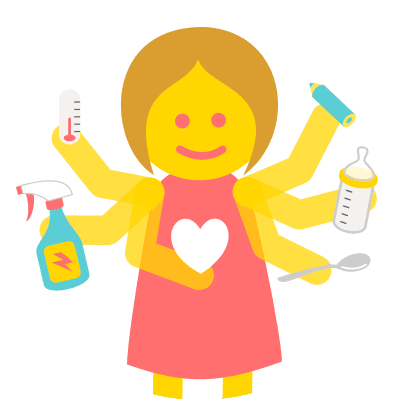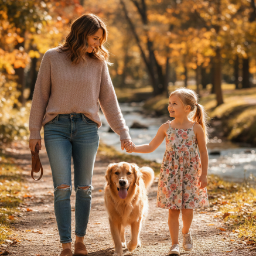Fire Safety Tips For Babysitters (Emergency Measures & Prevention)


Written & Illustrated by
Matthew James Taylor
Kidsit Founder, General Manager

Medically Reviewed by
Gina Maria Jansheski, MD, FAAP
Board-Certified Pediatrician, Medical Reviewer
Key Takeaways
- Obtain Essential Information: Upon arrival, gather emergency contact numbers, the family's fire escape plan, and the locations of fire extinguishers and exits.
- Conduct a Home Tour: Familiarize yourself with the layout, ensuring you know at least two escape routes from each room and can access windows for potential exits.
- Verify Safety Equipment: Check that smoke alarms and carbon monoxide detectors are present and functioning.
- Limit Fire Hazards: Keep matches, lighters, and candles out of children's reach, and maintain a safe distance from space heaters.
- Maintain Communication: Ensure you have a working phone to call emergency services if needed.
- Plan for Evacuation: Identify a safe location outside the home to meet in case of evacuation, especially in adverse weather conditions.
- Educate Children: Teach children fire safety basics, such as not playing with fire and understanding the sound of smoke alarms.
As a babysitter, you're in charge of the children that you're looking after. That includes in the case of an emergency like a fire.
By the time you're done reading this article, you should have a good idea of how to prepare yourself for a fire emergency and how to handle the situation if it ever happens to you while babysitting.
Get Information When You First Arrive
There's some basic preparation that you should do before parents leave you alone to babysit.
Gather Phone Numbers You Need
Write down all of the emergency phone numbers you might need.
In most cases, fire, ambulance, and police are all reachable through one central emergency response number, such as 911. (000 in Australia or 999 in the UK.) The global emergency number is 112. If you dial this, it will usually redirect you to whatever your local emergency number is.
Looking for an emergency number list? Download our free emergency contact sheets for your country.
You'll also want to have a cell phone number where the parents can be reached so that you can let them know immediately if something happens. Ask them for a back-up number, as well, in case they do not answer their phone.
It is important to have the full address and the major cross streets of the home you're babysitting at so you can give it to emergency responders.
Download our parent details form. It's perfect for recording all the emergency numbers you may need.
Ask If the Family Already Has a Fire Escape Plan
There's no point reinventing the wheel. Most families already have a fire escape plan and can give you instructions such as what exits to take, where to meet outside, and other details.
Get a House Tour
You'll typically want a house tour anyway when you begin a babysitting job so that you know where everything is located.
Besides just knowing where diapers and toys are kept, be mindful during your house tour to see where all the doors and windows are located. It's a good idea to make sure you're able to open the windows so you can get out if needed. Some windows can be tricky to open, and you never know what room you might end up in when a fire breaks out.
Wherever possible, you should try to find two different ways out of each room. That's particularly true for bedrooms.
Check for Smoke Alarms and Carbon Monoxide Detectors
It might feel a bit out of place to ask parents if you can check their smoke alarms. Personally, I wouldn't because you risk offending them and sending the message that you don't trust they're on top of basic home safety. But during your home tour, it's a good idea to keep an eye out for smoke detectors. Usually, you can catch a light blinking every 30 seconds or so on most smoke alarms or carbon monoxide detectors to show they're working correctly.
Have a Way to Call for Help
If you don't have your own mobile phone, you'll want to have one of the parents leave their own phone for you to use in case of emergencies. Alternatively, they might give you information about a trustworthy neighbor you can visit to use their phone.
Identify Shelter Outside
What if you need to leave the house because of a fire and it's the middle of winter?
It's already a challenging experience dealing with a child during an emergency. Adding below-freezing temperatures to the situation doesn't help.
You normally won't have a chance to get a child fully dressed before you exit the house. You'll be lucky just to get their shoes on. So they'll be totally unprotected from the elements and could be at risk of things like hypothermia depending on the temperature outside.
Ask parents if there's a trusted neighbor nearby that you can go to in case of an evacuation. This is particularly important if you're babysitting for a family that lives in a rural area, and firefighters will take more than a couple of minutes to arrive.
Stay Safe While Babysitting
Now you've got a fire escape plan and know what to do in case of an emergency.
It's just as important to be sure you're taking steps to minimize the chance of a fire in the first place!
Follow these guidelines to lower the chance of a fire starting on your watch.
Don't Leave Kids Unsupervised
This is just a fundamental rule of babysitting in every circumstance.
There are plenty of other reasons not to leave kids alone while you're supposed to be watching them. Besides potentially eating something they shouldn't or hurting themselves, you can add the fact that it's a fire hazard to your list of reasons not to leave children unsupervised.
Even if you're babysitting late and you've put the children to bed, it's a good idea to continue checking on them regularly.
Store Fire-Starting Tools Out of Kids’ Reach
Ask parents where they store matches or lighters to verify that they're either kept up high where kids can't reach them or in a locked drawer. Parents might keep matches put away, but may have overlooked some items like barbeque lighters that might be kept in a drawer by the back door.
Don't Smoke While You're Working
These days, most parents wouldn't want you smoking inside their home anyway. Even if the parents themselves are smokers, hopefully, they go outside to smoke.
You don't want to leave kids alone while you step outside for a smoke, even for a minute or two. The cigarette itself poses a fire risk if you don't extinguish it properly. Plus, you'll be leaving the children improperly supervised.
If you smoke, then there will also be a lighter that kids could easily find if they go through your bag.
Can't go a full babysitting shift without smoking? Try a nicotine patch or gum instead to get you through.
Make Sure Appliances are Turned Off
After parents leave, take the children with you and do a quick sweep of the home to be sure that any appliances that might pose a fire risk are turned off.
Most of them are located in the kitchen. Check things like the stove, coffee makers, kettles, or sandwich makers to be sure they're turned off. Avoid placing any papers or other flammable materials near the stove or hot surfaces.
When appliances aren't in use, roll up their cords so that kids can't pull them down off the counter.
You might also want to check the bathroom for things like a curling iron that may have accidentally been left on while the parents were getting ready to go out. Not only are these appliances a fire hazard, but they could burn kids. Be sure any electrical cords are kept away from sinks and water.
Don't Light Candles or Oil Lamps
Candles and oil lamps are just too big a risk when children are running around and could potentially play around with them or knock them over.
I can't think of many reasons why babysitters would be lighting candles anyway. You don't exactly need mood lighting when you're babysitting!
Unless you experience a prolonged power outage while babysitting, there's no need to break out the candles. Even if the electricity does go out, it's safer to use flashlights instead (and make sure you know where those are too.)
Don't Use Space Heaters
The US Consumer Product Safety Commission (CPSC) estimates that 25,000 fires each year are started by space heaters. Thousands of people visit the emergency room because of injuries related to space heaters, and hundreds of people die every year as a result of using them (source).
Avoid using space heaters except where absolutely necessary, such as if you're babysitting for a family whose furnace has broken.
If you must use a space heater, make sure to keep it at least 1 meter (3 feet) from furniture, beds, curtains, or any other flammable material.
Keep Kids Away from Fire Sources
Have kids stay clear of any sources of heat or potential fire like stoves, lamps, or heaters.
An electric lamp doesn't seem like a fire hazard, but if it falls over, a hot light bulb could be enough to ignite carpet or other fabrics. And when kids are playing, don’t let them put anything on top of the lamps.
Many fire hazards also present a burn risk to kids if they come into contact with them.
Practice Safe Cooking
Only cook if you have permission to do so from the parents you're babysitting for.
If you do cook, you'll need to pay constant attention both to your cooking and also the children that you're watching. That can be challenging. Just like with kids, looking away from the stove for a minute or two is enough for a pot of water to start boiling over or a fire to start.
When cooking on the stovetop, keep pot handles turned inward so that children can't pull them down or accidentally knock them when walking past. If you are going to bring a hot pan from the stove to the countertop or sink, check first that there are no little ones around that can get tangled in your feet or reach up and get burned.
If a there is a cooking fire, try smothering it immediately with a metal or glass lid. Avoid throwing water directly onto any kind of oil or grease fire, as it will just splash the flammable material around.
Every kitchen should have a small fire extinguisher. Check with parents before they leave to see if they've got one and where it's located. Normally they're kept under the sink.
If you're using the microwave, take care to not place any dangerous materials inside, such as aluminum foil or styrofoam.
If you're watching a baby and cooking, it's probably best to put them in a playpen, especially if you're going to have a hot pot or drink in your hand.
Do These Things in Case Of a Fire or Burn
If a fire happens or a child gets burned while you're babysitting, here are some proactive things you can do to mitigate the situation and prevent it from getting any worse.
Fire spreads really fast. The quicker you can react to a potential fire, the more likely you'll be able to stop it before it gets out of hand. So don't delay!
Stop, Drop, and Roll
We're all taught as children to stop, drop, cover our faces, and roll, in case our clothes ever catch on fire.
In the heat of the moment, it's very easy to panic and forget, though.
If a child you're babysitting ever has their clothing catch on fire, encourage them to stop, drop, and roll. Then try to smother the flames and put them out with something like a towel or blanket.
If they panic and run around, it will only fan the flames and provide more oxygen, accelerating the fire.
Treating Minor Burns
If a child gets a minor burn, such as by touching a hot pan or stove, you should immediately cool it down with cold water.
Running cold water over a burn or immersing it in cold water for 10 to 15 minutes will help to prevent further damage to the skin.
Don't run water over a burn if it has already started to blister, or begins to blister as you're running cold water over it. In case of blistered skin, charring, or completely white skin, you'll want to call for emergency help right away.
Test Food Before Giving it to Kids
Children don't know to check and make sure something isn't too hot before they touch it or put it in their mouths. If a trusted adult is giving it to them, they just assume that it's okay!
Make sure that you test any hot liquids or foods that you're giving to kids to be certain they're safe. You can do this by touching the food with a clean finger, or trying a bite yourself. If you're finding you need to blow on the food or drink to cool it down before you put it into your mouth, then you need to wait a few minutes before giving it to a child.
Babies are especially sensitive, and you should test heated milk or formula by gently shaking the bottle first to disperse the contents, then putting a few drops on the inner side of your wrist. It should feel room temperature or a little warm, but not too hot. See our essential guide to making baby formula which includes additional safety tips.
Fire or Smell Gas? Don't Turn on any Light Switches
In case of a fire or if you smell gas in the home, don't turn on any light switches.
The electricity could produce a spark that might cause a fire or even an explosion.
If a House Fire Gets Out of Control
On rare occasions, you won't discover a fire until it's too late. It could be the result of an electrical short or something else that isn't your fault or something that you could have avoided.
Get Outside
If you smell smoke, see flames, or hear the smoke alarm go off, it's time to get out of the house.
Don't waste time dressing the children. If it's cold outside, just wrap them up in a blanket. If you can grab the family pets without putting anyone at risk, then do so, but getting the children to safety is your first priority.
Stay Low
If the house is starting to fill with smoke, you will want to crouch down or even crawl to stay under the smoke. Hot air and smoke rise, so air closer to the floor is safer to breathe.
Check Doors Before Opening Them
Before opening a door, feel it first. You don't know if it will be hot from a fire on the other side.
Touch the door first, then the metal doorknob briefly to see if it's hot. If so, don't open the door. Instead, find an alternate exit to use.
Don't Use Elevators
If you're babysitting in an apartment building and there's a fire, never use the elevator. Always take the stairs.
Get to a Safe Outdoor Location and Call for Help
Once you and the children are out safely, get a safe distance away from the home and make sure everyone is okay.
Call an emergency number for help. Tell them what the situation is, and give them your address, as well as any other details, like if any people or animals are still inside the building. Stay on the phone until the 911 operator tells you to hang up.
Don't go back into the house to retrieve family pets or important personal belongings unless you are sure it is safe to do so (hopefully, you will have been able to get the pets out with you in the first place.)
After you've phoned 911 to report the fire, call the parents you're babysitting for to let them know first that everyone is okay, then what happened, and that they need to come home right away. And let them know exactly where you and the children will be. If that location changes for any reason, such as the Fire Department moving you to another location, call the parents immediately to inform them of the change so they won’t be out looking for you.
If You Can't Get Out
If you're trapped in a room and there's no getting past the fire, close the door, and seal around it as best as you can.
Use a cloth or towel and wedge it under the door to stop smoke from coming into the room. If you have access to water in the room you're in, getting the cloth wet first will help as well.
Conclusion
Fire safety is mostly about preparedness and prevention.
If you don't have a fire safety plan, you might panic when the situation arises. That's why it's critical to have the basic essentials like the location of fire extinguishers, fire escapes, and where to meet outside all mapped out in your head in advance.
In the majority of cases, serious fires can be prevented by constant supervision and taking the right precautions. But sometimes a fire can spring up that's totally out of your control. In that case, you need to know how to safely exit the building and call for help.
Want to learn some more babysitting safety tips? Check out my article: How to Be a Safe Babysitter.
Next:



























